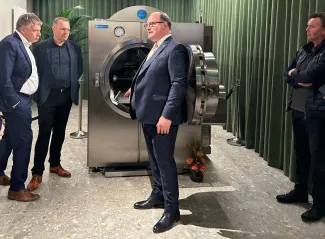VITO supports Belgium’s first aquamation pilot project
A sustainable and innovative third funeral option under development
Aquamation – also known as resomation – is an environmentally friendly alternative to burial and cremation. Whereas cremation is an energy-intensive process that emits CO₂ and other harmful substances, and burial often involves the use of land and chemicals in coffins and linings, aquamation offers a sustainable alternative that produces no air pollutants.
In Wilrijk, the first aquamation unit in Belgium has recently been introduced. With this, Pontes, together with VITO, KU Leuven, the University of Antwerp, VMM and Aquafin, is launching a pioneering pilot project to explore whether aquamation can become a fully-fledged third funeral option alongside burial and cremation.

What is aquamation?
In aquamation, the body of the deceased is placed in a sealed pressure vessel containing a solution of water and potassium hydroxide. This mixture is heated to about 150 to 160 °C under high pressure. The process accelerates natural decomposition, breaking down soft tissue within a few hours.
What remains is a porous bone structure that, after drying, is ground into a fine white powder — similar to ashes after cremation — which can be returned to the family, buried, or placed in a memorial site. For families, the experience of farewell remains much the same, but the process itself is significantly more environmentally friendly.
VITO’s expertise: focus on environmental impact and residual streams
VITO contributes its expertise in environmental analysis and circular management of residual streams to the Pontes project. Although the liquid remaining after aquamation is sterile, it may still contain certain components that require specific wastewater treatment.
VITO’s researchers are working with project partners to determine under what conditions this residual liquid can be processed safely and sustainably. Their findings will be crucial in mapping the environmental footprint of aquamation and ensuring that the process fully aligns with principles of sustainability and public health.
A Flemish first with international relevance
Globally, aquamation is already permitted in countries such as Norway, the United States and Australia, but its use in Europe remains limited. Flanders is now taking a pioneering role with this first pilot project. The results, expected in 2026, will serve as a basis for policy decisions on the possible introduction of aquamation as a third funeral option.
Flemish Minister for Home Affairs Hilde Crevits highlighted the importance of a thorough scientific approach at the project’s launch:
“It is essential that we investigate this carefully. A clear ethical and legal framework must ensure that this new form of farewell is conducted with full respect for the human body.”



